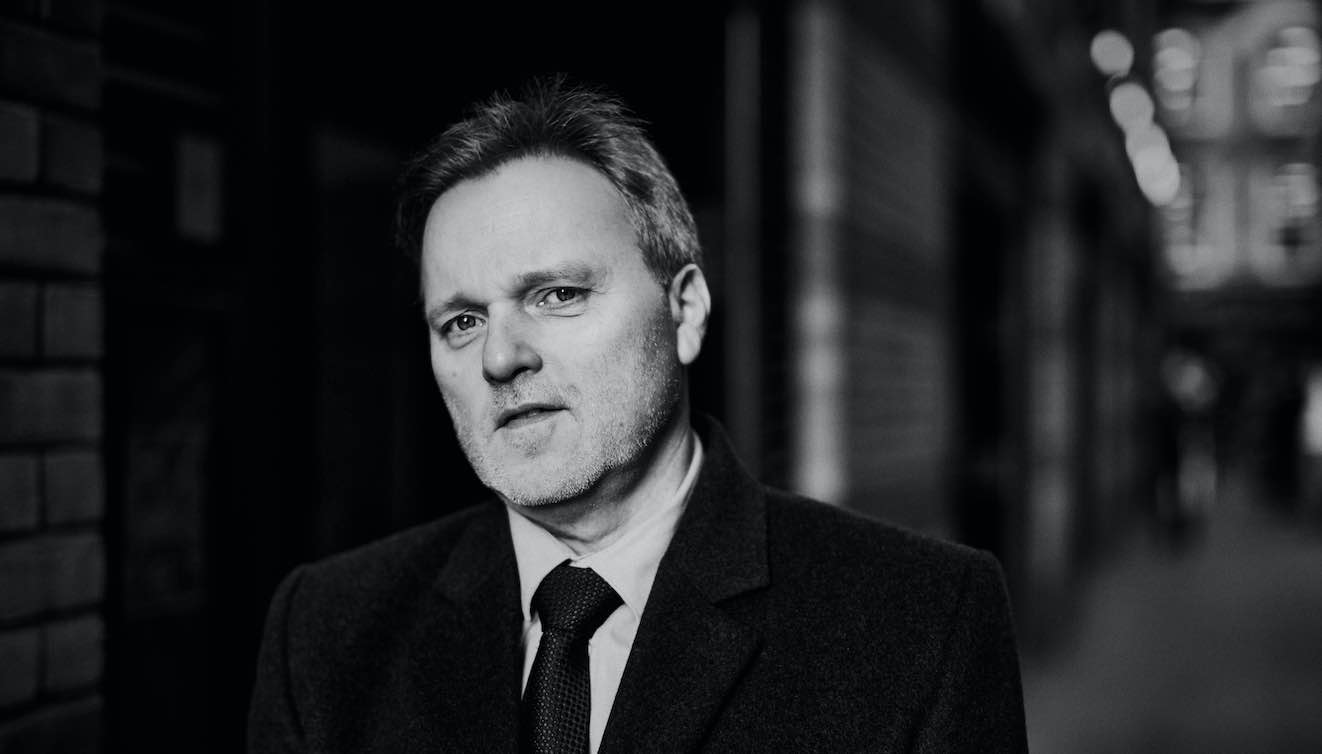Defending from the front
In Interviews
Follow this topic
Bookmark
Record learning outcomes

By Rob Darracott
I first met Mark Koziol in the mid-1980s. He was one of the founders of the Young Pharmacists Group (YPG), which flourished all too briefly as a post-university haven for energetic and professionally ambitious pharmacists. They were determined to challenge the status quo and to press the case for better and expanded roles for pharmacists in what came to be known as pharmaceutical care.
Mark was the public relations lead. Articulate and with a neat turn of phrase when making a telling point, good company and a born organiser. The YPG’s meetings were earnest, fun, political and urgent. Mark soon drew attention in another context, as the owner of the Birmingham-based locum agency PPLS (Provincial Pharmacy Locum Services) with an eye for marketing and sponsorship that set it apart from the rest. Its charismatic and opinionated owner was always happy to provide a comment, particularly to press the case for better treatment of the locum workforce as a vital part of the community pharmacy landscape.
It was at PPLS that the first seeds for what became the Pharmacists’ Defence Association (PDA) were sown. Mark describes those days as providing the first of two broader experiences that, together with two seminal moments we will come to, affected him profoundly. “Fifteen years creating and then operating a locum agency enabled me to get very close and dirty with a lot of employer organisations, understand their thinking, their motivation,” he says. “More often than not, success for them would be to incur the lowest possible expenditure, sacrificing things I thought should not be sacrificed – professional performance, standards, services for patients.
“I’m not saying all employers are like that, but over 15 years, I identified a worrying and consistent pattern of behaviour that spread like a plague throughout the profession. People were doing well if they were deemed to be tough area or regional managers. Younger ones coming through were taught ‘use that person as your role model’, but those role models were increasingly severe in the way they handled pharmacists on the ground.
“That experience made me understand just how vulnerable the interests of pharmacists were in the land of employers. Now, 98 per cent of the profession are employees or locums, and their lives and circumstances are being dictated by an increasingly small number of what I considered, in many cases, to be ruthless people. They did a damn good job creating profits for their employers, but in so doing, some of them lost sight of what we were supposed to be doing as a profession.”
We have some pretty devoted bad employers out there. Appalling practices
The second broader experience that prompted Mark to figure out how the interests of individual pharmacists needed to be represented came, he says, from a dichotomous situation. “In the YPG, I could see what you could achieve when you got a real bunch of enthusiasts with the profession at heart. I then got elected onto the RPSGB Council. “I was bewildered, frankly, by the extent to which the wider benefit of the profession was not a universal aim and objective of all of my elected colleagues,” he says. “Perhaps I was naïve, but the other thing I learned was the massive influence the large employers had at the then regulator. They had time in head offices to come up with plans, drill down on facts and figures, where government policy was going, how their organisation could fall into line.
“These guys would have it all worked out, the strategy was all boxed off, the direction of travel was assured. And they had large sums of cash to throw around to sponsor the conference or the library. A very small number of powerful voices were heading the strategy for the profession. It wasn’t particularly of benefit to the profession, but it was of benefit to a small number of very large and powerful employers.
“Those experiences led me to think there was a real need for an organisation to counterbalance that view with the voice of the individual pharmacist,” he says. “The PDA has often been misrepresented as being out to destroy the big guys. That’s not the case at all. There are an awful lot of good things they do, and they will have to do in the future if together we are to make a success of pharmacy, but there didn’t seem to be anybody that looked after the interests of employees and locums.”
Saving our Society
Standing down from the Council wasn’t Mark’s last strategic decision at the RPSGB. “Around 2004, the government wanted the RPSGB to drop its representative credentials and become solely a regulator of pharmacists,” Mark says. “We were at risk of losing our professional leadership body and bizarrely, for reasons known only to themselves, the then Council went along with this plan. A group of determined pharmacists decided to stop this and we started the ‘Save Our Society’ (SOS) campaign, involving both political action and legal challenge.
“Members crowdfunded contributions to the legal costs, which exceeded £350,000. In the end, the campaign resulted in the proposals being thrown out by a newly elected SOS Council and, ultimately, the creation of the GPhC. It also saved the members’ assets in a 160 year-old organisation that became the current Royal Pharmaceutical Society. I am not surprised few people want to celebrate this, but it demonstrated what can be achieved if pharmacists get together in a principled campaign.”
Pharmacists can find themselves vastly exposed if something dreadful happens. They need to be looked after independently
I ask Mark where this highly principled and ethical approach comes from. “Two places, really,” he says. “My family was torn apart in world war two. My dad was an orphan aged 13 when he found himself in a Siberian work camp, which has given me a huge interest in military history. It’s my big hobby. That takes you to a deep understanding of how important strategy is to just about everything we do in our lives. When I challenge this and that, it is almost certainly because, whatever the programme, it is a flawed strategy that will lead to no good in the short, medium or long term.
“A commitment to ethics and care for patients is the right strategy for pharmacy. The expertise of the pharmacist in the area of medicines has been woefully unexploited by the profession’s leaders going back several decades. That concerns me enormously. If you get the strategy right, everybody – patient, taxpayer, the NHS, the profession, will do well.”
The right strategy for pharmacy
Running a successful locum agency and early ventures into representation provide the backdrop, but the catalyst for the PDA were two ‘seminal moments’. The first was an early run-in with the RPSGB in the YPG days. “The idea for a pre-reg exam was a good thing, but then came the question of who’s going to pay for it,” Mark says. “In a civilised society, we give a hand up to those less fortunate. I was absolutely horrified by the idea coming out of the RPSGB that we were going to give this pre-reg exam to young pharmacists coming through, and were going to get them to pay for it.”
At a special general meeting of the Society called to sort the matter, Mark proposed or seconded – he can’t remember which – a motion to spread the cost of the pre-reg exam fee across the profession. “I worked out it was only going to cost every pharmacist about £1.85 on the registration fee,” Mark recalls. “On the train down, I bought a sandwich for, funnily enough, £1.85. I put the sandwich on the lectern as I was proposing the motion and said ‘for the cost of a British Rail sandwich, we could ensure that young pharmacists know they have joined a civilised profession because those who came before helped them along the way’.
“We lost the debate by one vote,” he says. “And I’ll never forget that the then president of the Society, who was sitting in front of me, clenched her fist, waved it in the air, and went ‘yes’. They’d won by one vote and she was happy we were going to stick it to the students for the rest of their career.
 “That was a seminal moment, not just because I saw the difference between those who cared about the weakest and those who didn’t, but because had we won by one vote, we could have made a difference to future generations of pharmacists. I realised how important campaigning was. That caused me to get involved in all sorts of campaigns over many years, because it’s important to try to make things better, irrespective of whether things are stacked for or against you. To do nothing is to automatically accept defeat.”
“That was a seminal moment, not just because I saw the difference between those who cared about the weakest and those who didn’t, but because had we won by one vote, we could have made a difference to future generations of pharmacists. I realised how important campaigning was. That caused me to get involved in all sorts of campaigns over many years, because it’s important to try to make things better, irrespective of whether things are stacked for or against you. To do nothing is to automatically accept defeat.”
The second moment was the ‘peppermint water case’, in which an extemporaneously prepared mixture for colic ended up 10 times the correct strength, and a baby died. Mark was a council member at the RPSGB at the time. “The council of the regulator would see all the information, all the evidence, all the arguments, in the way the wider profession would not,” he says. “The conclusion I arrived at, which caused me to resign from the Council at the end of my term, was that never again should an employee pharmacist, in that case also a pre-reg, rely on their employer in a court of law. On a really important issue, whose reputation is going to be defended?
“That was the thing that led to the creation of the PDA. We have always said you must rely on your own resources and your own independent representation for any cases you are involved in, because your reputation is far too important to be left to the wider interests of your employer.
“I’m not saying this because I believe employers are crooked, but they have a responsibility to look after thousands, sometimes tens of thousands of other employees. Company law requires them to look after the interests of the business and the shareholders. Individual pharmacists can find themselves vastly exposed if something dreadful happens. They need to be looked after independently, and that’s the reason the PDA was set up.” The PDA launched in 2003, less than 18 months after the peppermint water case.
At first, employers were happy to allow PDA representatives to sit in disciplinary hearings, but the honeymoon was short-lived. “Area managers had never had somebody who knew their onions sitting alongside the pharmacist they were disciplining; they were getting in trouble all over the place. Employers went for the easy option. They said ‘you guys have no legal right to be here, so we will carry on as before, thank you very much.’
it’s important to try to make things better, irrespective of whether things are stacked for or against you. To do nothing is to automatically accept defeat.
“We realised unionisation would allow us to deliver the kind of service we wanted for our members, so we went for listed union status to give us the legal right to attend those meetings.”
Mark recalls the PDA national conference convened to ask members what they thought. “Older pharmacists who remembered the early ’70s days of union largesse, burning braziers and picket lines were horrified at the idea of a pharmacists’ union. But the vast majority, and particularly younger pharmacists, said ‘anything you think is going to improve the service to members, go and do it’.”
Listed union status was achieved in 2008, but ironically it was a landmark case with Boots that nudged the PDA towards the fully independent and certificated trade union status that would pave the way for it achieving its first formal recognition rights just over a decade later.
Mark describes the PDA’s first major class action. “Boots had imposed changes to premium rates of pay for Sundays, reducing double time to time and a half. We said to Boots, ‘how about we discuss this with you centrally?’ They said ‘we’re going to handle this case by case’. That made it more difficult. The numbers of pharmacists involved in the case dropped from a couple of hundred, but tens of pharmacists went all the way though to an industrial tribunal. We won; the judge said it was an unlawful act.
“That class action made us realise that we should apply for independent and certificated trade union status – a much higher hurdle. They inspect you, figure out who you are and what you do, before they give it to you, but once we got it, we went for union recognition and the rest is history.”
As a relatively new organisation, the PDA has some advantages over a more traditional trade union. “We’re not hidebound with rules and regulations and how things have been done in the past,” Mark says. “We like to think we are quite fleet of foot as an organisation.”
He says the PDA’s three key functions operate symbiotically. “We are a trade union. That gives us legal rights a defence association doesn’t have. We are a discretionary defence association, which means there are things we can protect our members from that wouldn’t be covered by a standard insurance scheme. And our entire service is backed by an insurance contract with substantial financial capacity in the event you need to spend hundreds of thousands of pounds on lawyers. Put those three things together and you probably end up delivering the most formidable form of defence there is.
“You might have insurance for a defence at an employment tribunal, but who wants to go there? Notwithstanding that we have insurance in place to pay for one, good work is done much earlier on avoiding members getting to a tribunal, a statutory committee or a criminal court,” Mark says.
 There are other advantages to status, particularly following formal recognition agreements. The PDA employs around 45 staff (not including those employed in the onsite staff nursery), but it has a growing network of union representatives and officials in the workplace. “We have now trained 17 Boots pharmacists to work on behalf of the PDA and its members within the Boots framework. There are probably 60 or 70 people out there in the wider UK network that aren’t directly our employees but to whom we have given the training necessary to handle individual cases.”
There are other advantages to status, particularly following formal recognition agreements. The PDA employs around 45 staff (not including those employed in the onsite staff nursery), but it has a growing network of union representatives and officials in the workplace. “We have now trained 17 Boots pharmacists to work on behalf of the PDA and its members within the Boots framework. There are probably 60 or 70 people out there in the wider UK network that aren’t directly our employees but to whom we have given the training necessary to handle individual cases.”
It’s challenging and changing work, especially as pharmacists move into new workplace settings, like GP practices. “We are seeing things now we have never seen before as a consequence of thousands of pharmacists going into that space,” Mark says. He returns to the importance of strategy. “There are some pretty worrying things starting to emerge, all of which link back to a strategy not having been thought through properly in the first place.”
Caseload increases as practice changes
The PDA’s is a caseload that keeps growing. “Last year, we dealt with well over 5,000 cases; I suspect this year it will be substantially more,” says Mark. “We are involved in at least one large class action around data breach, involving 1,300 to 1,400 pharmacists. You have to interview each individual to understand what their position is so you can represent them properly. We have had to take on extra personnel to handle that one class action.
“We are now representing many thousands of Boots pharmacists in negotiations over their terms, pay and conditions. We are having to take examples of issues and present case studies as to why we need to fix certain things. The GPhC has reported a 15 per cent increase in hearings, and for the first time ever, we are handling cases at the Care Quality Commission (CQC) because pharmacists are now starting to work in GP practices.
“It’s a ruthless regime here, but if I have achieved anything, it is to have assembled some exceptional individuals at the PDA and be fortunate enough to work with them. The hours are very long; getting the testimonials that come in from the members thanking you makes it all worthwhile.”
Mark says the successful outcome of the Elizabeth Lee case, in which a pharmacist was prosecuted for a dispensing error which resulted in a fatality, tops his list of things that mean a lot to a lot of people. “One of the PDA’s biggest successes was getting the law interpreted as it was in that case in the Royal Court of Appeal,” he says. “Because of that action, the law now says that only owners of businesses can commit an offence under Section 85.5 of the Medicines Act [labelling offences]. That was a huge step forward for a largely employee profession. It is therefore an irony that the Rebalancing Board of the Department of Health has not been interested in having us involved, given our experience, in situations like that, of how courts behave, and how the Crown Prosecution Service approaches things.”
I suggest that with membership of over 30,500, the PDA is the largest organisation in pharmacy. Mark says that might be true, but he is not focused on numbers. “If you work on hard won issues that are important to pharmacists, the membership numbers take care of themselves,” he says. “You see a dangerous trend starting to emerge in the caseload, and you campaign about it. When you do that, people say ‘these guys are on the money, they seem to know what’s going on’.
“We have some pretty devoted bad employers out there. Appalling practices, like taking on locums with absolutely no intention of ever paying them. We have a super category – offshore organisations who set up e-pharmacy portals to sell dangerous substances to vulnerable members of the public. They need a pharmacist superintendent, so they stalk young, inexperienced pharmacists to take on that role. When everything goes wrong, the perpetrators move on, leaving the superintendent to be handled by UK regulatory discipline. We’re working with the GPhC and the CQC to try to stomp these kinds of practices out, but they are on the increase.”
Many of the PDA’s key issues require long-term action. “In 2005, we all agreed the current rules on supervision were not fit for purpose. We have wasted years on a lame duck idea of running a pharmacy without a pharmacist, when we should have been concentrating on how we make the pharmacist more accessible. Now the contract frameworks are moving to where the pharmacist in a pharmacy becomes a key player in the eyes of the public, we may not be able to exploit that opportunity unless we can change the rules.”
Mark has recently suggested the creation of a new, credentialled and regulated technician role. “We’d rather be the architects of the future than the victims of somebody else’s plan,” he says.
Further union recognition is on the cards. “Strategically, it made absolute sense to go for Boots first because it was the largest employer of pharmacists in the UK, and the place where the largest number of pharmacists would benefit. But we also know the influence it has; if we can improve terms within Boots, it will inevitably have a halo effect on other employers. We are now in discussions with a number of employers; those discussions are shaping up nicely. Part of our campaign focus for the next couple or three years is large scale union recognition across the pharmacist workforce.
The hours are very long; getting the testimonials that come in from the members thanking you makes it all worthwhile.
“The more strategic priority is that we believe this country can no longer afford the medically-led model of the NHS, with doctors taken away from patients to manage the local primary care bureaucracy. It’s utter madness. The best model, inevitably, will involve a multidisciplinary team, but let’s not create a whole army of mini-doctors, let’s put pharmacists into GP practices to focus on medicines and pharmaceutical care. Let’s re-engineer how primary care is delivered, so people can work smart and not just hard. That’s our next big strategic campaign. The fact that a lot of these pharmacists are being asked to do the wrong thing with their unique skills is an issue we are now looking to challenge.”
One of Mark’s proudest achievements is the creation more than a decade ago of the demonstrator ‘YPG pharmacy’ in Dudley (officially Priory Pharmacy), now managed by Olutayo Arikawe. “The YPG pharmacy is all about showing that a re-engineered primary care system can drive results and become more cost-effective,” he explains. “It has been recognised hugely by the local community, who are represented on the steering board.”
Mark says a local ecosystem has been created because of the pharmacy. “On the first day, we got eight prescriptions. On the second, we got nine. At the end of three months, we got 12. We are paid to deliver eight or nine core services [under a Local Professional Services contract], but we deliver 30, typically, because it’s a social enterprise, not for profit pharmacy. Everything the pharmacy generates is put back into delivering and driving new services. We go to local schools to talk about sexual health. I have a photograph of an outreach smoking cessation stand in a supermarket, with the supermarket pharmacy staff in the background trying to figure out what the hell we are doing there. You wouldn’t be able to run a normal business that way, but this was developed and launched as a practice laboratory.”
He comes back to the PDA. “When you are working with the kind of people we have here, results appear in front of your eyes. They plan their work because they have a strategy. Then they work their plan. That’s what gets results. Yes, you need a bit of luck along the way, but you have to have a solid plan that holds together. Then you can start to make progress.”

